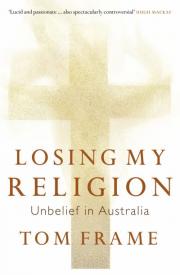Review: Two books by Tom Frame #2 – Losing My Religion
 Losing My Religion is the second Tom Frame book I have read recently. The title says it all – it’s about “Unbelief in Australia.” Frame is a bishop in the Anglican Church and the head of a theological institution and this book is a passionate attempt to understand the context of his church and his gospel. With the long-term prevalence of anti or non-religious sentiment in Australian society, and it’s growing impact, it is a worthy examination.
Losing My Religion is the second Tom Frame book I have read recently. The title says it all – it’s about “Unbelief in Australia.” Frame is a bishop in the Anglican Church and the head of a theological institution and this book is a passionate attempt to understand the context of his church and his gospel. With the long-term prevalence of anti or non-religious sentiment in Australian society, and it’s growing impact, it is a worthy examination.
In this sense, this book is not an apology for the Christian faith as much as it is a consideration of that which the Christian faith must interact with or make a defense to. He sets out his agenda clearly; to give the background or context for unbelief in Australia, to examine the causes of unbelief and “the reasons for the loss of religious beliefs in Australia”, and finally the “consequences of unbelief” (Page 7).
Perhaps wary of the critiques he will receive from positive atheists and other more militant nonbelievers (not that I’ve come across any review from an obviously anti-theistic point of view, pointers welcome in the comments) Frame spends a significant amount of time defining his terms – “faith”, “belief”, “disbelief”, “unbelief”, positive and negative atheism and anti-theism etc. This is a necessary precursor to examining statistics and other background material about the extent of unbelief in Australia. It is also extremely useful to cut across the grand sweeping statements that abound in this area about the death or religion (on the one hand) or the up and coming rise of the religious right (on the other hand). Some myths are dispelled simply by knowing what you’re talking about.
The section on the causes of unbelief is also very useful. His broad overviews are excellent introductions to history – the rise and fall of different philosophies and their impact, the various characters in the development of science and how they are taken today. It is good solid stuff and for the most part quite objective. It is only in the examination of the theological response to unbelief (characterised as “confusion and incoherence”) that you do sense some of the passion he has for the church to get this engagement right.
If this book is controversial (as Hugh Mackay’s imprimatur on the cover says) I think that controversy rests in his section on the “consequences” of unbelief. He attacks the so-called New Atheists (Dawkins, Hitchens et al.) – whom he calls anti-theists – not so much for their position, but for their attitude. He finds that this intolerance infects not just intellectual debates but the whole concept of secularism in a way that corrupts true plurality and makes it a form of tyranny.
“I want to conclude this discussion of tolerance by highlighting my concern that changing attitudes towards religious beliefs will have a bearing on attitudes towards all beliefs in Australia. When it becomes acceptable, even admirable, to mock and ridicule a person’s religious convictions and customs – especially when the intention is to provoke an indignant reaction – the next step is to prohibit the expression of religious sentiments in all public places and forums. This has been the approach of the French Government in recent years and there are signs that Australia is poised to do likewise under the guise of promoting social cohesion and cultural harmony. Citizens are free to hold religious beliefs and to act on them, but only in their personal lives and only within their homes. Once religion is completely privatised, the next step usually involves incursions on freedom of conscience and obstructions to the right of free association. We are some way from this kind of tyranny but it must be recognised that movements in this direction are usually incremental… I believe that contemporary anti-theism has some of the characteristics of fundamentalism and, like all fundamentalisms, needs to be opposed.” (Pages 267-268)
Frame therefore calls for a genuine secularism in Australia. He also calls for a genuine church that can engage within this freedom, not presuming belief, not using coercion, but taking its place in the market place of ideas and so exhibiting a genuine spirituality with a substantial kerygma.
This is a unique book. It mixes polemic with vulnerability, precision with empassioned argument. It is prophetic for both church and world. For those who are persistent in their derision, it will be ignored. For others it will be provide food for thought and a basis for conversation. In that sense it lives out what it envisions – a genuine engagement.
My only concern is that it is a bit too “meta” – a book about books, an idea about ideas. It doesn’t so much argue the gospel of Christ but for the space for the gospel of Christ. That’s no bad thing though, and the question of how to fill that space, how to preach the gospel well in the light of unbelief, is a whole new task.


